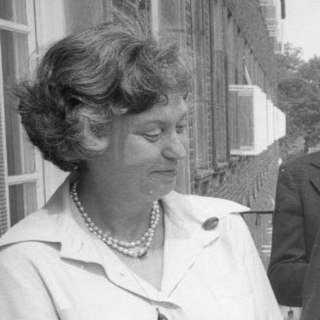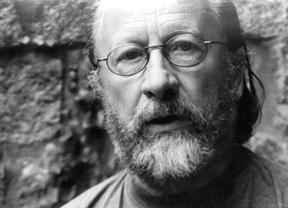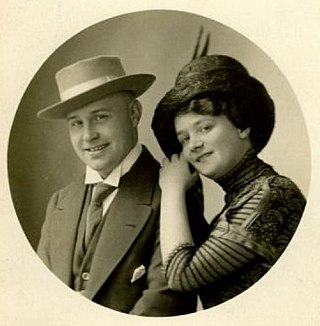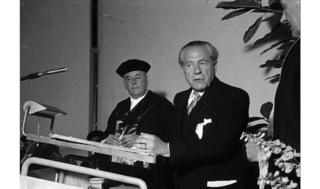Related Research Articles

Hans Werner Henze was a German composer. His large oeuvre of works is extremely varied in style, having been influenced by serialism, atonality, Stravinsky, Italian music, Arabic music and jazz, as well as traditional schools of German composition. In particular, his stage works reflect "his consistent cultivation of music for the theatre throughout his life".

The Deutsche Oper Berlin is a German opera company located in the Charlottenburg district of Berlin. The resident building is the country's second largest opera house and also home to the Berlin State Ballet.
Strom may refer to:

Paul Dessau was a German composer and conductor. He collaborated with Bertolt Brecht and composed incidental music for his plays, and several operas based on them.

Suhrkamp Verlag is a German publishing house, established in 1950 and generally acknowledged as one of the leading European publishers of fine literature. Its roots go back to the "arianized" part of the S. Fischer Verlag. In January 2010 the headquarters of the company moved from Frankfurt to Berlin. Suhrkamp declared bankruptcy in 2013, following a longstanding legal conflict between its owners. In 2015, economist Jonathan Landgrebe was announced as director.,
Kammersänger (male) or Kammersängerin (female), abbreviated Ks. or KS, is a German honorific title for distinguished singers of opera and classical music. It literally means "chamber singer". Historically, the title was bestowed by princes or kings, when it was styled Hofkammersänger(in), where hof refers to the royal court.
Hans Vogt was a German composer and conductor.

The Internationale Maifestspiele Wiesbaden is a theater festival in Wiesbaden, Germany. Established in the late 19th century after the Bayreuth Festival, the festival is one of the most distinguished international theatre and music festivals in the world. It is presented annually in May at the Hessisches Staatstheater Wiesbaden, the State Theatre of Hesse in the capital Wiesbaden. The festival currently features performances of operas, ballets, plays and musicals. Visiting companies, mostly from European theaters, present their recent productions along with performances of the Theater Wiesbaden. Concerts from a wide array of music genres are featured as well as artistic circus acts and modern dance presentations. Lectures, recitals, cabaret performances, art showings and readings are also part of the program.

Hermann Robert Richard Eugen Kasack was a German writer. He is best known for his novel Die Stadt hinter dem Strom. Kasack was a pioneer of using the medium broadcast for literature. He published radio plays also under the pen names Hermann Wilhelm and Hermann Merten.
Die Stadt hinter dem Strom is a German language existentialist novel by Hermann Kasack, published in 1947 in Berlin. It is considered one of the most important novels written in Germany after World War II, dealing with the horrors of Nazi Germany, along with works such as Thomas Mann's Doctor Faustus and Günter Grass' The Tin Drum.
Hermann Wolfgang Sartorius Freiherr von Waltershausen was a German composer, conductor, teacher and writer.
Margot Guilleaume was a German operatic soprano, a member of the Hamburgische Staatsoper. She was an academic teacher at the Musikhochschule Hamburg from 1950 to 1978, and was known beyond Germany as a singer in oratorio and concert.
Daniel Schiebeler was a German writer, poet, librettist and Protestant hymnwriter. He wrote librettos for operas and oratorios, set by composers such as Georg Philipp Telemann, Johann Adam Hiller and Carl Philipp Emanuel Bach.

Carla Henius was a German operatic soprano and mezzo-soprano, voice teacher and librettist. She played a decisive role in promoting recent works by composers such as Arnold Schönberg, Karlheinz Stockhausen and Luigi Nono for the stage. She wrote the libretto for an opera by Aribert Reimann.

Antigone oder die Stadt is an opera in two acts, written in collaboration by composer Georg Katzer and librettist Gerhard Müller. They based it on Antigone, the play by Sophocles. Conceived in the German Democratic Republic (GDR) in 1988 as a comment of the East German system, the opera premiered, after German reunification, at the Komische Oper Berlin on 19 November 1991, staged by Harry Kupfer and conducted by Jörg-Peter Weigle.
Stephen Climax is an opera in three acts by Hans Zender, who wrote his own libretto based on James Joyce and Hugo Ball. It was premiered on 15 June 1986 at the Oper Frankfurt, staged by Alfred Kirchner and conducted by Peter Hirsch. The opera was published by Breitkopf & Härtel. A 1990 production at La Monnaie in Brussels was recorded.

Rudi Gfaller was an Austrian operetta composer and singer. Born in Vienna, he began his career as an actor and singer and appeared in various provincial theatres in Germany. In 1906, he composed the first of his twelve operettas. Gfaller was married to the operetta singer Therese Wiet and often appeared with her in Leipzig where the couple were based for most of their careers. In 1943 he retired to their house in Bad Ischl where he died at the age of 89.
Doktor Johannes Faust, Op. 47, is an opera in three acts by Hermann Reutter. The libretto was written by Ludwig Andersen, based on an old puppet play Doktor Faust on the Faust topic. The opera was premiered by the Oper Frankfurt at its house on 26 May 1936, staged by Walter Felsenstein. It was published by Schott. A revised version was first performed at the Staatstheater Stuttgart on 8 June 1955, conducted by Ferdinand Leitner.

Ludwig Strecker Jr., also Ludwig Strecker der Jüngere, was a German music publisher, and an author of opera librettos which he wrote under the pen name Ludwig Andersen. He authored, and published through the Schott publishing house, two of the most successful German contemporary operas of the 1930s, Egk's Die Zaubergeige and Reutter's Doktor Johannes Faust.

Hermann Dechant is an Austrian, conductor, flautist, musicologist, composer and music publisher.
References
- 1 2 Lascelles, George, ed. (1957). Opera . Rolls House Publishing Co. 8 (1): 393.
{{cite journal}}: Missing or empty|title=(help) - 1 2 Vogt, Hans (1982). Fritz Oeser, Musica 36, volume 2, pp. 194–196, 1982, re-published on fritz-oeser.de (in German)
- ↑ Hans Vogt operone.de
- ↑ Kasack, Hermann (1996). "Rückblick auf mein Leben" in Hermann Kasack zu Ehren: eine Präsidentschaft in schwerer Zeit. Wallstein Verlag, p. 59. ISBN 3-89244-217-7 (in German)
- ↑ Hermann Kasack / 1896–1966 / Biographie Archived 2011-08-27 at the Wayback Machine from Hermann Kasack: Fälschungen. Erzählungen. Frankfurt am Main: Suhrkamp, 1975, University of Potsdam 1996 (in German)
- ↑ Die Stadt hinter dem Strom; oratorische Oper in drei Akten worldcat.org